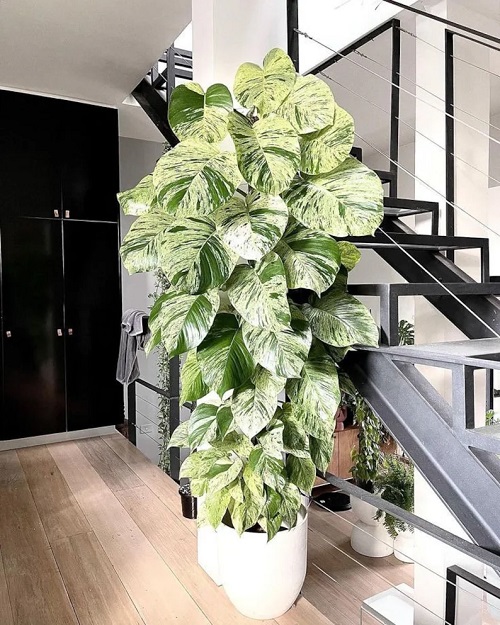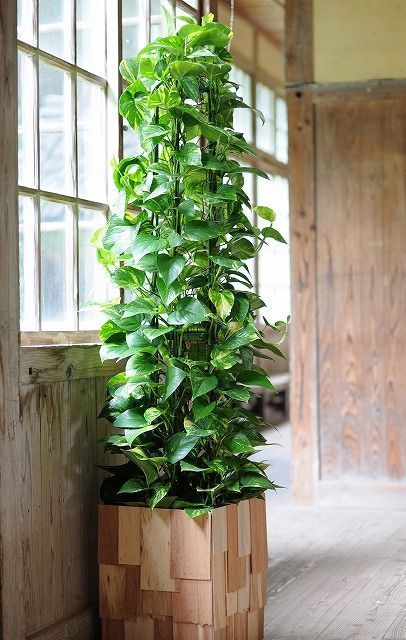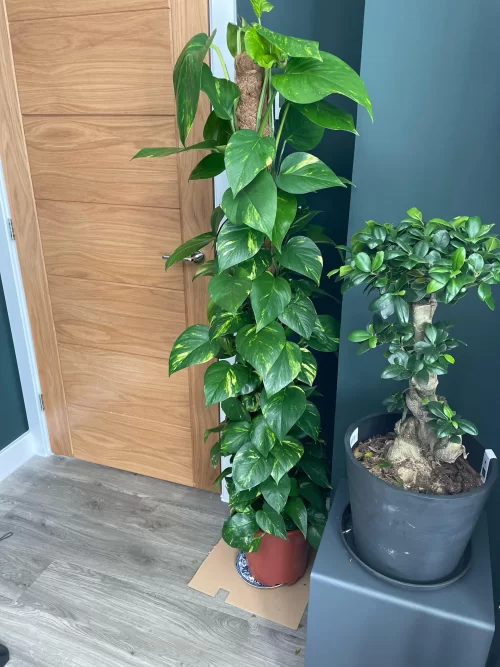Growing Pothos as a Tree adds a twist to the look of this otherwise vining plant, making it a center of attraction either indoors or outdoors.
Imagine transforming everyone’s favorite pothos, a classic vining houseplant, into a stunning tree-like form. This concept might seem a bit odd and impossible, but you can do it easily. Here are the top secrets for Growing Pothos as a Tree!
Here’s how you can grow poinsettia as a tree!
Can Pothos Be Trained Like a Tree?
Absolutely! Pothos can be encouraged to adopt a tree-like form hypothetically. It’s all about guiding its growth and providing the right support and training.
Best Pothos Varieties for Crafting a Tree-Like Structure
When training a pothos to mimic a tree form, choosing the right variety is crucial. The best Epipremmum aureum types exhibit vigorous growth, wide leaf spread, and a lush, dense habit.
- Golden Pothos: Known for its rapid growth and features heart-shaped, variegated leaves with splashes of gold. It is ideal for creating a dense and vibrant tree-like appearance.
- Hawaiian Pothos: Perfect if you want the plant to achieve a towering height indoors.
- Jade Pothos: Noted for its resilience and fast-growing vines. Deep green, glossy leaves provide a lush, monochromatic look. Great for a more uniform, green tree effect.
- Marble Queen Pothos: Grows slightly slower and not much bigger but is worth the wait for its stunning foliage.
- Neon Pothos: Known for its vigorous growth habit and offers a vibrant, eye-catching tree-like structure.
- Cebu Blue Pothos: Unique for its long, cascading vines. Offers a more exotic and unusual tree appearance.
9 Best Variegated Pothos Plants
How to Grow Pothos as a Tree: Step-by-Step Guide
1. Choosing the Right Support Structure
A tall, sturdy moss pole, trellis, or wooden stake is essential. It provides the necessary support for the pothos to climb upwards.
Height: Ensure the support is tall enough to achieve your desired tree height.
2. Training the Vines
Gently wrap the pothos vines around the support. You can secure soft plant ties or twine without damaging the plant.
Encourage Vertical Growth: Guide new growth upwards by attaching it to the pole.
3. Pruning and Shaping
Trim the vines to encourage bushier growth. This will make your pothos look more like a tree canopy. Snip back the longest stems to just above a leaf node (the point where leaves emerge).
Cut back any too-long or leggy stems to encourage fuller growth. Pinch off the growing tips to stimulate branching.
Pinching Tips: Pinch off the tips of the vines to stimulate new branches, contributing to a fuller appearance.
Do not miss out on these pothos curtain ideas for the most modern appearance
4. Proper Plant Care
Pothos need bright, indirect light to thrive. Adequate light is crucial for robust growth.
Water and Humidity: Keep the soil consistently moist but not waterlogged. Pothos also appreciate a humid environment.
5. Creating a Dense Canopy
Plant multiple pothos vines in the same pot for a fuller tree-like appearance. This will create a denser canopy as they grow upwards.
Layering Vines: Train different layers of vines at varying heights on the support structure to create a tiered effect.
6. Encouraging Root Attachment
If using a moss pole, keep it moist to encourage the aerial roots of the pothos to attach to it. This helps the plant climb more naturally and securely.
7. Patience and Adjustment
Shaping a pothos into a tree-like form doesn’t happen overnight. It requires patience and regular adjustments.
Regular Maintenance: Continuously guide new growth, prune, and adjust ties as the plant grows.
Pothos Leaves Curling? 15 Reasons and Solutions
Quick Points to Remember While Growing Pothos as a Tree
- Growing pothos as a tree indoors may not result in an exact ‘tree-like’ shape, but you can surely help it achieve a good height inside a home (5-6 feet).
- Pothos thrive under the canopy of larger trees in their natural jungle habitat, which filters sunlight. This is why when growing pothos outdoors, selecting a spot below a large tree or a tall wall is THE BEST.
- The plant will use them as a natural support structure, climbing its way up and taking the shape of a tree! Bonus – The decomposing leaves and natural matter around a tree can enrich the soil, benefiting the Pothos – another advantage!
- The best variety for the job is your regular pothos – their leaves can grow upto 1-2 feet wide, and they can attain an impressive height of 40-50 feet!
- Trees and walls can create a microclimate with more stable temperature and humidity levels, resembling the Pothos’ tropical origins.





